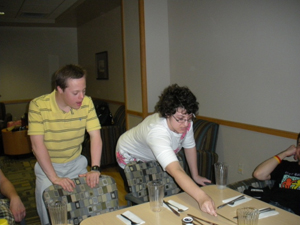Vanderbilt LEND Collaborates With Dietetic Internship Program Trainees To Share Best Practices In Nutrition With Students With Intellectual Disabilities
April 26, 2011

|
| Trainees and students with disabilities participate in a nutrition exercise. |
Research has shown that good nutrition and exercise habits have a significant effect on academic performance and achievement. In an effort to share this knowledge with students with intellectual disabilities, a new practice setting has been added to the rotation schedule of Vanderbilt University Dietetic Interns.
Partnering with the Vanderbilt LEND and with Next Steps at Vanderbilt, a 2-year postsecondary education certificate program for students with intellectual disabilities, the dietetic trainees are educating and engaging the Next Steps students in healthy eating and active living habits.
"The rotation is beneficial for both the Dietetic interns and the Next Steps students," said Dietetic Internship Educational Coordinator, Dianne Killebrew, Med, RD, LDN. "The Next Steps students are learning what healthy eating and active living habits are and how to choose and practice those habits in their lives. The interns are gaining the valuable experience of working with individuals with disabilities. In some cases, this rotation may even be changing the course of their career trajectories."
Through the course of the rotation, the interns teach a 90 minute class on food safety. In the course, the students with intellectual disabilities learn about issues like how to keep microbes out and their food safe, how to effectively wash their hands, how to keep cooking areas clean, and how to prevent the cross contamination of food. The interns rotate co-teaching and observing. They also participate in Friday Food Forays, a component of the Next Steps program that includes planning a healthy meal, a trip to the grocery store, and food preparation and presentation for the students and their peers.
"Not only has it been a good professional endeavor for our interns, it also has been interesting to see how it weaves into their social lives," said Killebrew. "The interns have been thrilled to run into Next Steps students outside of their classroom. There have been several instances in the community where this has happened. They get really excited about it. The Next Steps students get really excited about it too."
"I think having the professional relationship with the Next Steps students and then having that social relationship component naturally occur is invaluable for both parties," said Metabolic Dietitian and LEND faculty member, Gina Wey, RD, LDN. "You know we're all just people, we all have different functioning levels, but we all have feelings and we all want to be the best that we can be. A rotation like this teaches professional skills, and it also teaches acceptance. What a wonderful gift to leave our program with."







